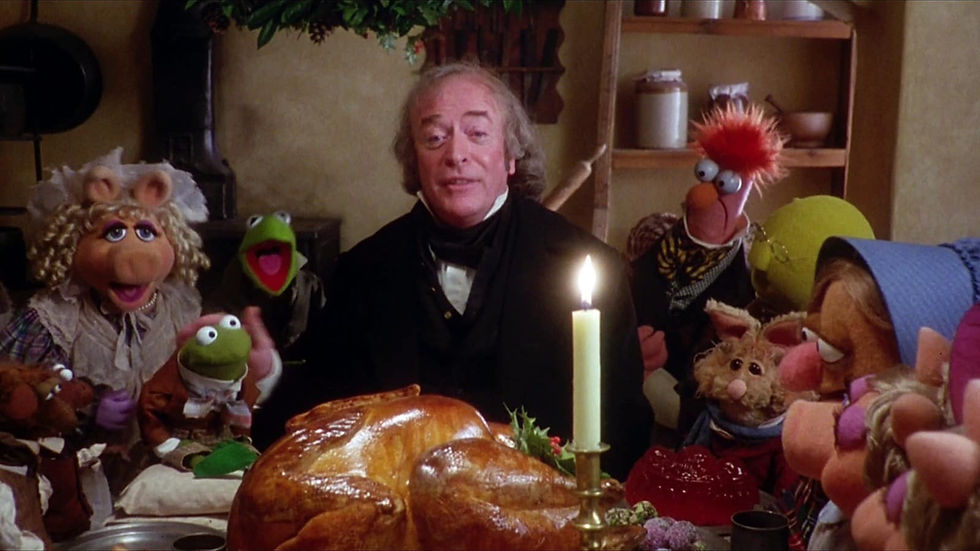The Muppet Christmas Carol (1992)
- Soames Inscker

- Nov 14, 2025
- 4 min read

Few adaptations of Charles Dickens’ timeless novella have enjoyed the enduring affection bestowed upon A Muppet Christmas Carol. Released in 1992 and directed by Brian Henson—son of the legendary Jim Henson, for whom this was the first feature film after his father’s death—the film manages a delicate feat: it remains faithful to the spirit and moral depth of Dickens while embracing the irreverent humour, heart, and musical exuberance of the Muppets. The result is one of the most beloved family Christmas films of the modern era.
The story remains true to the original 1843 text. Ebenezer Scrooge, the miserly moneylender who has allowed bitterness and isolation to define his life, is visited on Christmas Eve by three spirits who reveal the consequences of his choices. What distinguishes this adaptation is not deviations from the source but its framing: Gonzo the Great appears as Charles Dickens himself, accompanied by Rizzo the Rat, acting as narrators. This inventive device cleverly blends storytelling accuracy with comedic commentary, making the film both educational and entertaining.

The Muppet ensemble fill out the familiar roles: Kermit the Frog as the good-natured Bob Cratchit, Miss Piggy as Emily Cratchit, Fozzie Bear as Fezziwig, Statler and Waldorf as the Marley brothers, and an assortment of other Muppets as townsfolk, ghosts, and comic interlopers. Yet the heart of the film rests on the interplay between these colourful characters and the lone human lead.
Michael Caine: A Scrooge for the Ages
Michael Caine’s performance as Ebenezer Scrooge is nothing short of outstanding. Rather than playing to the whimsy of his Muppet co-stars, Caine performs the role with full dramatic commitment, as if he were acting in a straight period adaptation. This choice pays huge dividends. His Scrooge is authentically cold, irritable, and emotionally shuttered, making his gradual transformation all the more powerful.
Caine’s interactions with the Muppets never feel condescending or self-aware; he treats them as fully real. This sincerity elevates the film and allows its emotional beats—particularly the scenes with the Cratchit family and the Ghost of Christmas Yet to Come—to resonate genuinely rather than superficially.
The songs, composed by Paul Williams, enrich the narrative with warmth and melody, making the story accessible to younger audiences without diluting its themes. Highlights include:

“Scrooge”, a witty and rhythmic introduction to the main character.
“One More Sleep ’til Christmas”, a tender number that captures Kermit’s gentle optimism.
“It Feels Like Christmas”, a joyful celebration led by the exuberant Ghost of Christmas Present.
“Bless Us All”, a sincere family ballad that provides one of the film’s emotional peaks.
The original version of the film also included the poignant love ballad “When Love Is Gone”, sung during the Ghost of Christmas Past sequence. Although cut from the theatrical release for pacing, it remains a beautifully written piece and has since been restored in some versions.
Williams’ music blends heartfelt sentiment with accessible melodies, helping the film achieve its blend of humour and emotional depth.
Despite the puppet characters and comedic flourishes, the film adopts a surprisingly atmospheric and sometimes eerie tone, reflecting Dickens’ original mixture of warmth and supernatural dread. The design of the Ghost of Christmas Yet to Come—towering, wordless, and shrouded—is particularly effective, providing a moment of genuine menace.
Sets and costumes are richly realised, evoking a Victorian London that feels both storybook-like and authentically wintry. The production design contributes to the sense that this is not a parody, but a sincere retelling filtered through the Muppets’ unique sensibilities.
One of the film’s greatest achievements is its balance. The humour is frequent, clever, and character-driven—Rizzo’s asides, Gonzo’s earnest narration, and the inevitable chaos wrought by various Muppets—but it never undermines the story’s moral seriousness. The themes of redemption, generosity, compassion, and the importance of human connection remain central.
Children are drawn in by the colour and comedy, while adults appreciate the faithfulness to Dickens and the emotional authenticity of Scrooge’s transformation.
Over the decades, The Muppet Christmas Carol has grown from a warmly received release into a modern Christmas classic. It is often regarded as one of the finest Muppet films and one of the best screen adaptations of Dickens’ novella. Its ability to appeal across generations is one of its greatest strengths: nostalgic for adults, approachable for children, and uplifting for all ages.

The film also holds particular significance as the first major Muppet production created without Jim Henson. Brian Henson and the performers honour that legacy with a work full of joy, craftsmanship, and emotional sincerity.
The Muppet Christmas Carol is a triumph of adaptation. It respects Dickens’ original intent while adding humour, music, and the unmistakable charm of the Muppets. With Michael Caine’s memorable portrayal anchoring the film, sumptuous musical numbers, and a heartfelt delivery of one of literature’s most enduring tales, it remains a festive essential.
Warm, witty, and unexpectedly moving, the film continues to delight audiences more than thirty years after its release—proving that even with felt and foam, the spirit of Christmas shines through unmistakably.




